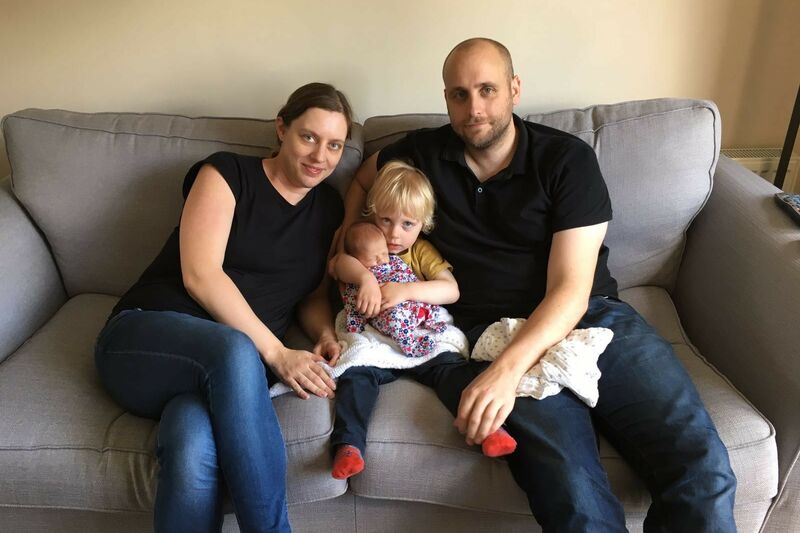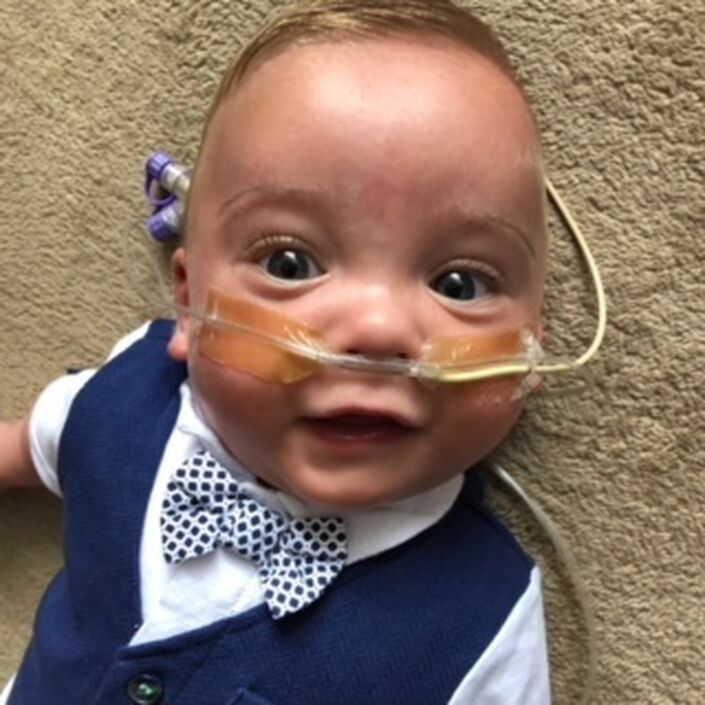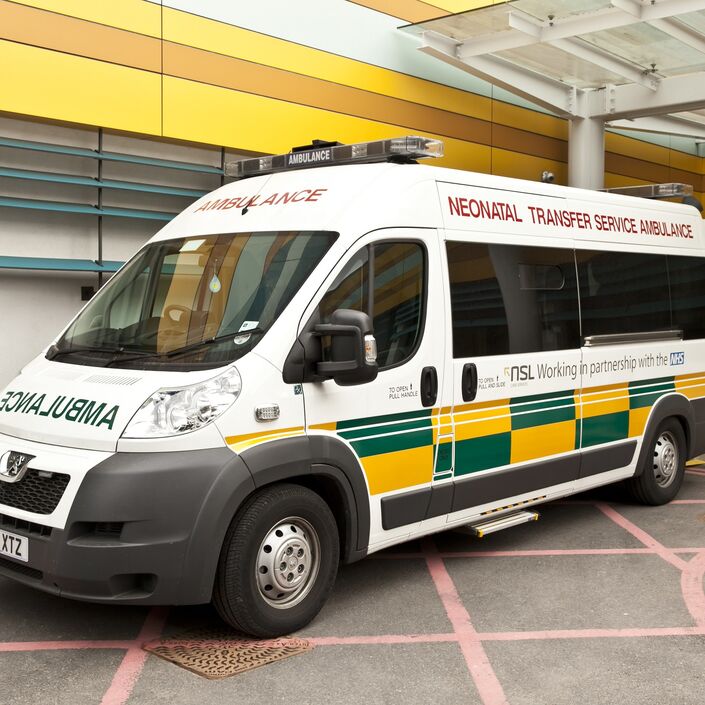My wife, Laura, was diagnosed with breast cancer when she was 20 weeks pregnant with our daughter, Elodie. She had a lumpectomy while still pregnant, but it was decided that it was best to wait to start chemotherapy until after Elodie was born. After many scans and tests, the obstetricians and oncologists weighed up the risks to my wife and our unborn daughter, and decided that Laura should be induced at 35 weeks.
When Elodie popped out - and she did literally pop out - she gave a big shout and the midwives and doctors at Leicester General were very happy with her. All that changed around 20 minutes later, when she started having difficulty breathing. Sally, the midwife who delivered her, had been so calm and composed during the birth but now seemed visibly concerned. At her insistence, the paediatricians moved Elodie into the special care baby unit. I went up there with her, but was then asked to go back to Laura. We heard nothing for hours.
Eventually, a nurse came to take us to the special care baby unit (SCBU). The doctor there explained how serious her condition was, and that they had spent the past few hours trying to stabilise her. We were told that she had suspected patent ductus arteriosus (PDA) and a pulmonary haemorrhage. She urgently needed to be moved to intensive care. The problem was that there were no neonatal intensive care cots available in any of the local hospitals. After much searching, a space was found for her at the Jessop Wing in Sheffield, 60 miles away.

While all this was happening, Laura’s blood pressure was going crazy. She developed pre-eclampsia while pregnant with our son, Joseph, and now had postpartum pre-eclampsia following Elodie’s birth. She was going to have to stay in hospital for the time being. It was around 10.00pm when the ambulance crew arrived to transfer Elodie to Sheffield (she’d been born a little before 8.00am that morning). I was told to go home to try to get some sleep, and to call Jessops first thing in the morning for an update. Of course, I did not get any sleep.
I called the hospital at 5.00am before driving up to Sheffield to be with Elodie. The person I spoke to on the phone was a junior doctor called Abi. She explained to me just how poorly Elodie was, and what they were doing to treat her. Over the course of the following two weeks, Abi and her colleagues, Chris, Hannah, and Emily, were the doctors primarily responsible for Elodie’s care. They were always there - literally always there - to give me updates on her progress, and to answer my questions. And I had a lot of questions.
I first arrived at the hospital in Sheffield at around 6.30am, and I asked at the reception for neonatal intensive care. Only, I couldn’t get the words ‘intensive care’ out without crying. I was directed to the unit, and met there by Nina. She was the nurse who’d been looking after Elodie since she arrived. Nina explained that although Elodie was still on a ventilator, the main concern was her blood pressure. She was very poorly. Nina then took me in to see her. As soon as I saw her in the incubator, hooked up to the ventilator and other machines sustaining her life, I started crying uncontrollably. Nina handed me a box of tissues.

Neonatal Intensive Care units (NICUs) are horrible places. It’s the most stressful place I’ve ever been. There are alarms going off constantly, as numbers flash on the screens of monitors and syringes administer IV medication. I found myself watching the numbers on Elodie’s monitors more than I was watching her in the incubator, clinging to life. Trying to guess which way the numbers would go, and dreading them moving in the wrong direction. I struggled to stay in there for more than a couple of hours at a time.
Fortunately, Sandra, a Bliss nurse and parent liaison, arranged for me to have a family room to stay in just outside the intensive care unit. She was very apologetic about the state of the room. They were in the process of being renovated, but mine had not yet been done. I really didn’t care. I had somewhere to stay that was only a minute away from Elodie. Somewhere I could go to escape the emotional distress of having a seriously ill baby, but without it feeling like I was abandoning her.
About five hours after I got to Sheffield, my dad arrived. He had driven up from Lyndhurst in the New Forest that morning. My dad hates hospitals. He can normally only manage half an hour before he wanders off to find a coffee shop. But he had driven all that way to be with me and Elodie, and to offer whatever support he could. I took him in to meet his granddaughter. My mum and Laura’s parents had seen her the previous night in Leicester, so I was pleased that Dad could see her that morning.

The next two weeks brought improvements and setbacks on a daily basis. After Laura was discharged from hospital and her blood pressure stabilised, she came up for visits most days, along with various combinations of grandparents and sometimes our son, Joseph. The visits from Joseph were always my favourites. This period also coincided with Laura’s first session of chemo, so there were a few days she couldn’t visit. It was always such a relief when Laura arrived, as not only was I pleased to see her, but it also seemed that the huge weight of responsibility I felt for Elodie was being shared for a few hours.
Elodie came off the ventilator after a week. It was a huge step, and other than a slight scare with her feeding, she began to improve steadily. It was around this time that I really allowed myself to start believing she would make it. After twelve days in Sheffield, a bed was found for her in Leicester Royal Infirmary, and I went home. Four days later, we were able to bring Elodie home too.
During the time Elodie was in Sheffield, every single doctor and nurse treated her with their exceptional medical skills, and treated me and my entire family with compassion. They truly cared about all of us. We were lucky, and thanks to the expertise of the staff at Jessops, our daughter pulled through. But there were other babies who didn’t make it; two of them in the same room as Elodie. I saw first-hand the impact it had on the doctors and nurses who were caring for them. They show such care and empathy for the babies and their families, yet this must place an almost unbearable emotional burden on them. I have no idea how they continue to do their jobs in such a professional and compassionate way, but I will be forever thankful that they do.
We went back to Sheffield on Elodie’s first birthday. It felt like the right thing to do, and I’m very glad we did it. We saw a few of the nurses who looked after Elodie, including Nina, the nurse who had been so kind to me when I first arrived there a year earlier. Although it was a very happy time for us, I couldn’t help but think how it would have coincided with a heart-breaking anniversary for the families of the babies who weren’t as lucky as Elodie.

Elodie is now a healthy, happy 16-month-old, wandering from room to room, picking things up and putting them down somewhere entirely different. Her personality is really starting to show through, and she makes us laugh every day. Laura has recovered from chemotherapy and further surgery, and we continue to realise on a daily basis, despite everything that happened, just how lucky we are to all be here together. And that is primarily thanks to the doctors and nurses in our amazing health service.
To read Laura’s experiences of both breast cancer and prematurity, please visit her blog.
If you have been affected by any of the issues mentioned in this post and would like support, view our online support pages


